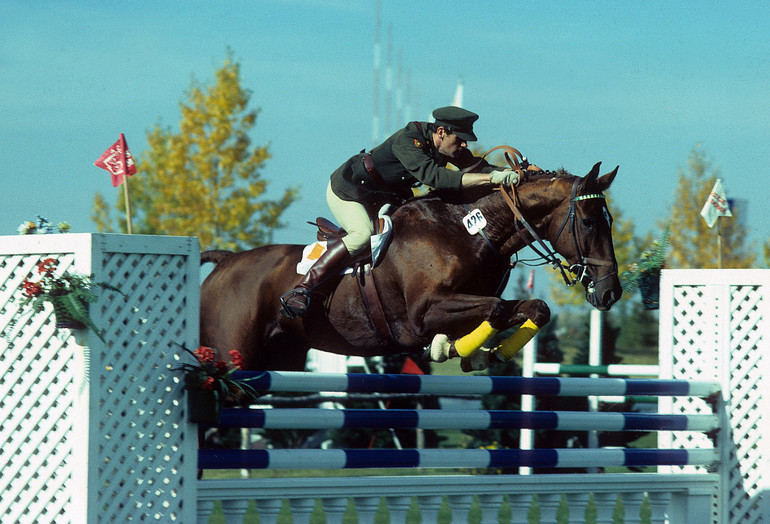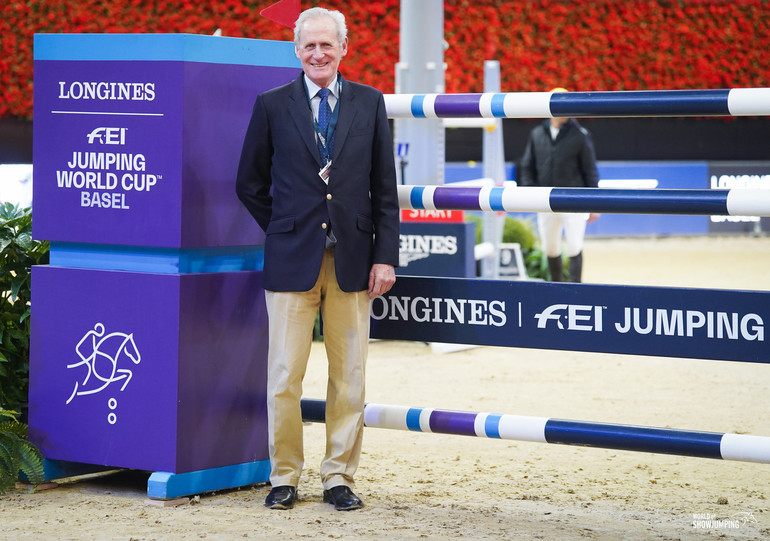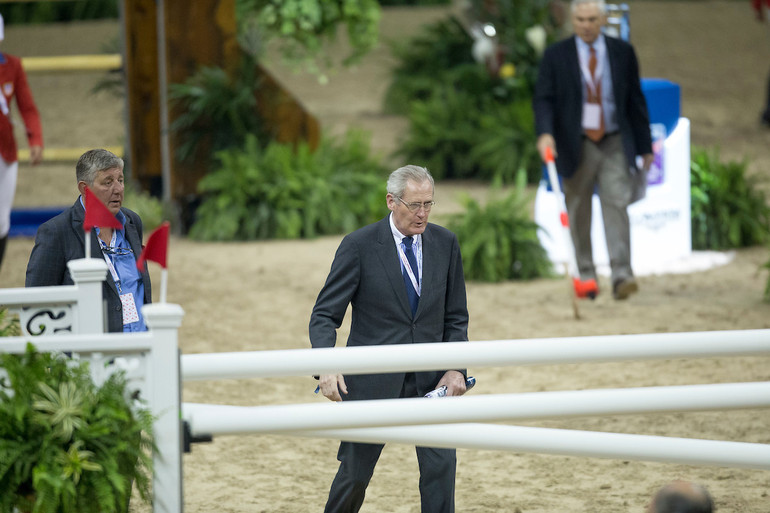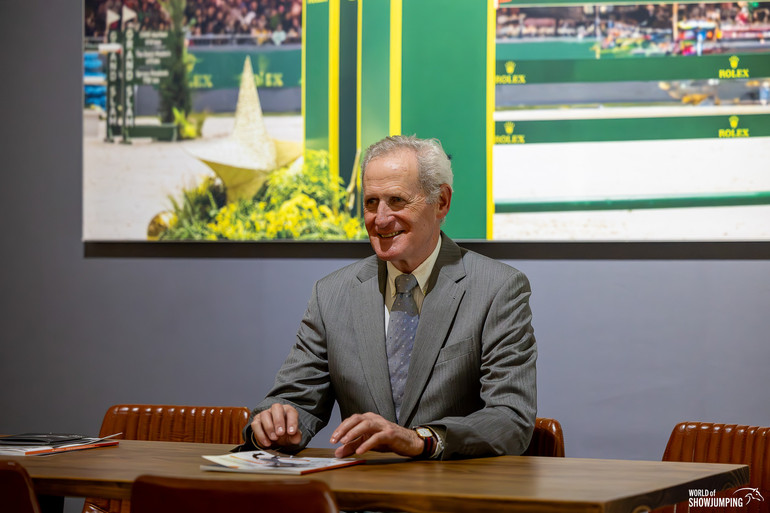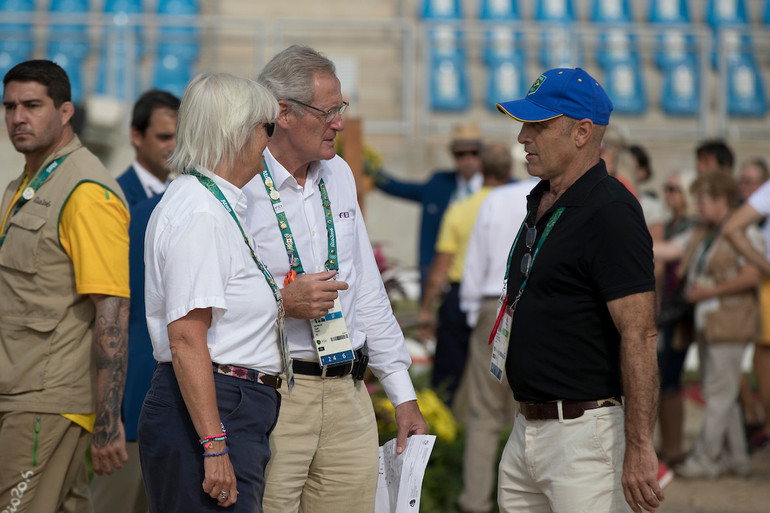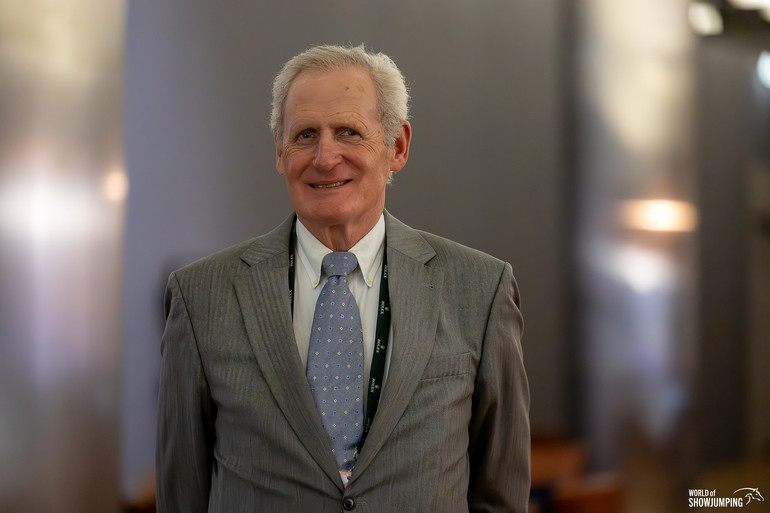 John Roche joined the FEI in May 1987, starting his career in the Sport Department under former FEI President Her Royal Highness Princess Anne who took over the role from her father His Royal Highness Prince Philip, Duke of Edinburgh – the FEI’s longest serving president (1964-1986). Roche’s initial responsibilities covered jumping, driving and the FEI calendar, and he was also secretary to the jumping and driving committees. Photo © Jenny Abrahamsson/WoSJ.
John Roche joined the FEI in May 1987, starting his career in the Sport Department under former FEI President Her Royal Highness Princess Anne who took over the role from her father His Royal Highness Prince Philip, Duke of Edinburgh – the FEI’s longest serving president (1964-1986). Roche’s initial responsibilities covered jumping, driving and the FEI calendar, and he was also secretary to the jumping and driving committees. Photo © Jenny Abrahamsson/WoSJ.
Text © World of Showjumping
“I was employed at the FEI for 33 years and I must honestly say it was an honour and a pleasure to have had the possibility to work there and contribute to the sport worldwide,” John Roche tells World of Showjumping. “When you look at the sport today, it has grown so much over the past 30 years,” the 70-year-old Irishman continues. “The number of international events has exploded, as has the number of riders competing internationally. The level of riding and the quality of horses competing today is just unbelievable. It's really fantastic to see and a pleasure to watch.”
And watching horses jump is what Roche – who still rides – loves the most. “It's awesome. There's so much talent, the horses today are absolute athletes – showjumping is really poetry in motion.”
Roche joined the FEI in May 1987, starting his career in the Sport Department under former FEI President Her Royal Highness Princess Anne who took over the role from her father His Royal Highness Prince Philip, Duke of Edinburgh – the FEI’s longest serving president (1964-1986). Roche’s initial responsibilities covered jumping, driving and the FEI calendar, and he was also secretary to the jumping and driving committees. He was promoted to the position of FEI Jumping Director in 2007, and also held the titles of FEI Jumping World Cup™ and FEI Jumping Nations Cup™ Director as well as Director General Stewarding. In February 2020, FEI announced that Roche would be retiring and eventually the late Marco Fuste was announced as his successor in December that same year, while Todd Hinde now holds the position of FEI Jumping Director.
From Ireland to Switzerland
“My parents bred horses,” Roche, who grew up in Co Wexford, Ireland, tells about his childhood. “I grew up on a farm and started riding when I was very young. I rode ponies all over Ireland and then eventually joined the Irish Army where I spent 13 years. During that time, I was on the winning Irish team in the Nations Cup in Aachen in 1979. Going back to Aachen now feels wonderful, it hasn't changed; the atmosphere is exactly the same as it was then, absolutely electric.”
I was employed at the FEI for 33 years and I must honestly say it was an honour and a pleasure to have had the possibility to work there and contribute to the sport worldwide
Roche left Ireland in 1985 and moved to Switzerland, joining the FEI when he was 33. “I was approached by the FEI, and since the proposal sounded interesting I said yes,” he recalls. “The Secretary General of the FEI at the time knew me from the circuit.”
While Roche came to influence equestrian sports greatly throughout his service to the FEI, he had no idea where joining this organisation would take him when he first accepted the job offer. “When you join an organisation like that, you are told what your responsibilities are, what you have to do and you get along with it,” he says about the very beginning of his career. “As time goes by, you basically see together with officials, riders, owners and organizers what needs to be changed, introduced or developed to enhance and develop the sport.”
Increasing pressure and growing number of events
During his time at the FEI, Roche held the titles of FEI Jumping World Cup™ and FEI Jumping Nations Cup™ Director, and it is the development of the latter that he today is disappointed with. “If you look at the Nations Cups, you have the European Equestrian Federation’s Longines EEF series on three- and four-star level and then you have the Longines League of Nations™ created by the FEI which actually reduces the five-star Nations Cup-series to very few events. Most of the top CSIO5* venues are now out of the Longines League of Nations™ and I think that's very sad. However, I think the World Cup has remained strong and it continues to be organised worldwide.”
While Roche applauds the high level of sport today, there are aspects he worries about. “Today, we have many international events worldwide, and riders and horses are under stress to compete at all these venues,” he points out. “In my opinion, a very important subject for the FEI and the National Federations is to ensure that the welfare of the horse is respected. It is their responsibility, together with the riders – naturally. Riders who want to be successful have to have a great feeling for the horse, otherwise it doesn't work.”
A very important subject for the FEI and the National Federations is to ensure that the welfare of the horse is respected
“We are talking about a huge industry that has an enormous financial impact in many countries worldwide,” Roche continues. “The sport is growing and there is more and more money coming in – and the more money and attention there is, the greater the temptation is to use the horses extensively. In my opinion, the idea of limiting the number of times a horse can compete internationally per year is something I support, and it should be discussed. There are no rules to forbid competing every week if you want to, and there are certainly horsepower issues already. It is something that should be addressed, and I suppose the way of addressing it is to limit the number of times you can compete internationally with the same horse. For example, after three weekends, do horses need a break? I'm sure they do. If you look at the current events, the level of sport is very high and a lot is being asked from the horses. Horses competing internationally today have amazing talent and incredible ability and the sport needs to be careful that not too much is asked of them. I'm not saying that this happens, I'm just saying that we have to make sure that it doesn’t happen. This really needs attention, and course designers have a responsibility too in relation to what they ask the horses to do.”
“There's so much prize money and so many international events, and there needs to be some kind of rules and regulations to ensure that horses are protected,” Roche points out. “If horses are not respected right across the board, then we will have a lot of difficulties in the future with organizations that are already against equestrian sport. Their welfare needs to be on the agenda all the time.”
Riders should use the voice they have
Over the years, the relationship between the FEI and the riders has been subject of discussion on numerous occasions with riders more often than not claiming that they are not being heard. “There's the FEI Jumping Committee and riders are entitled to have a member on the committee,” Roche explains.
Riders do have an official position, and they do have a voice; they just need to use it
“That member has to bring forward the views and opinions of the riders; that's a responsibility. Hence, riders do have an official position, and they do have a voice; they just need to use it. If riders have issues that they want to have discussed, they should bring them forward – and they have their representative in the Jumping Committee for this purpose.”
International Jumping Owners Club
“A stakeholder group – in which I have been a member on its Executive Board since its creation – that doesn't have a representative and a position in the Jumping Committee, and which in my view needs to be changed, is the owners,” Roche continues.
The owners need to be represented in the Jumping Committee
“Without the owners, we have no horses, and the owners need to be represented in the Jumping Committee. They have been lobbying for this for a long time and unfortunately it hasn't been granted for them. It's a shame, and they need to be taken on board – there's no question about that.”
If you can’t prove it, did it happen?
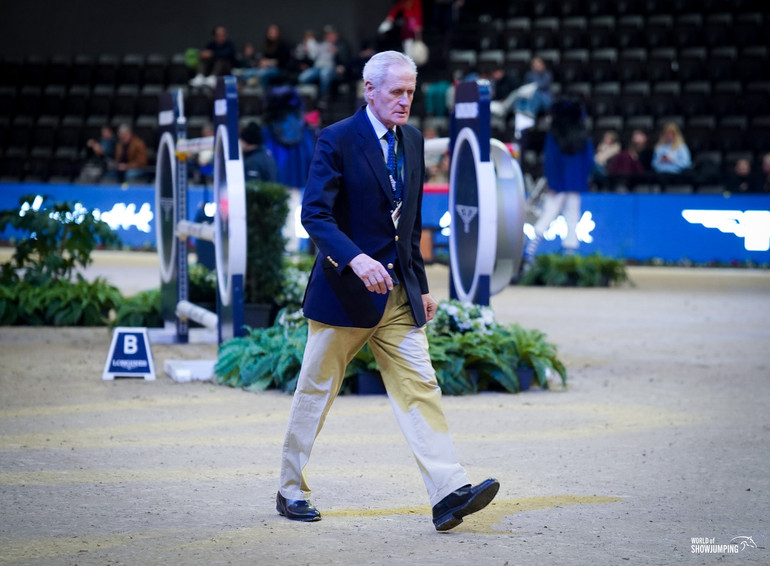 "When I was with the FEI, I had one wild card at my disposal for all CSI five-star events and two for other shows. I distributed those wild cards to up-and-coming riders, to give them the opportunity to compete internationally at higher level, to promote themselves and get enough ranking points so they could eventually obtain invitations to the bigger international events," Roche tells. Photo © Nanna Nieminen/WoSJ.
"When I was with the FEI, I had one wild card at my disposal for all CSI five-star events and two for other shows. I distributed those wild cards to up-and-coming riders, to give them the opportunity to compete internationally at higher level, to promote themselves and get enough ranking points so they could eventually obtain invitations to the bigger international events," Roche tells. Photo © Nanna Nieminen/WoSJ.
Another subject that is being brought up again and again is whether the top sport slowly is turning into a closed circuit for a limited few as some events are developing into more commercial enterprises where it’s an option to pay to participate at five-star level. While FEI on paper does not allow paycards, world ranking points can de facto be earned at events where riders pay to participate and with the FEI invitation system being tied to a rider’s position on the world ranking this questions the meritocracy of the sport.
You hear a lot about riders paying to get into higher level events, but when you actually try to find proof, nobody will tell you anything
“That's not bad,” Roche says about the invitation system being tied to the world ranking. “It is partly tied to the ranking, but the organising committees also have a percentage and they can invite who they want. When I was with the FEI, I had one wild card at my disposal for all CSI five-star events and two for other shows. I distributed those wild cards to up-and-coming riders, to give them the opportunity to compete internationally at higher level, to promote themselves and get enough ranking points so they could eventually obtain invitations to the bigger international events.”
“You hear a lot about riders paying to get into higher level events, but when you actually try to find proof, nobody will tell you anything, because to this day it is not allowed to pay to compete – and everyone knows it,” Roche says.
Officials are there to ensure fair play
Director General Stewarding was another title that Roche held while working for the FEI. “I worked very closely together with the officials; judges, course designers and stewards,” he explains. “The role of the stewards is very important. They're responsible to make sure that there's fair play and that there is no abuse. They know what their responsibilities are, and I would imagine they are living up to those responsibilities. It is the responsibility of the stewards and the judges to ensure that things are correctly done, that stable security and all that kind of things are in place and that the rules and regulations are respected.”
It is the responsibility of the stewards and the judges to ensure that things are correctly done
“If there are issues, then the foreign judges need to place that in their report and then it would be followed up by the FEI – at least it would have been followed up by the FEI when I was there,” Roche says when asked why some events seem to get away with continuously disregarding certain FEI rules and regulations. “However, you need to receive a report to follow something up – otherwise, what can you do?” he asks in return.
“When it comes to governing equestrian sports, I think it is essential that the higher positions of power are held by people deeply rooted in sport and not by bureaucrats in paid or honorary positions,” Roche concludes. “This sport is unlike any other, and you have to be a horse person to understand it.”
12.2.2025 No reproduction of any of the content in this article will be accepted without a written permission, all rights reserved © World of Showjumping.com. If copyright violations occur, a penalty fee will apply.



